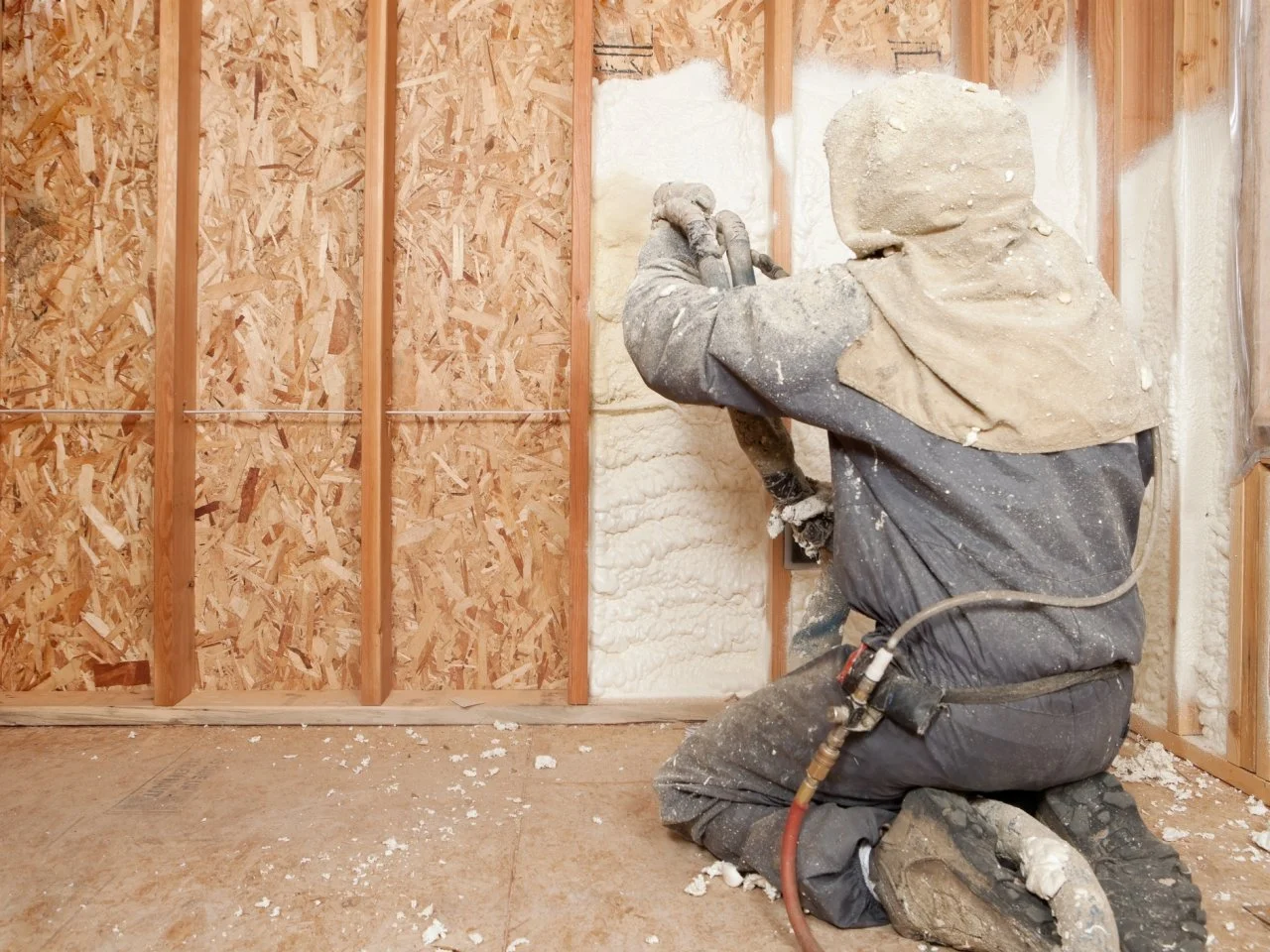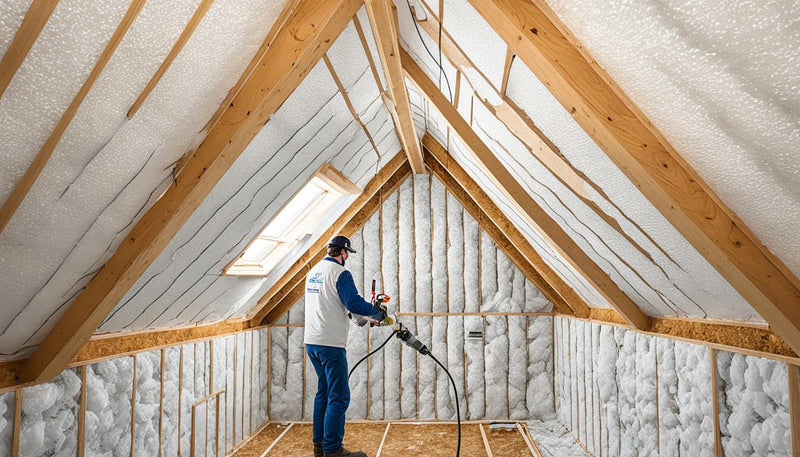The Ecological Impact of Spray Foam: Sustainability Factors To Consider
The Ecological Impact of Spray Foam: Sustainability Factors To Consider
Blog Article
Spray Foam: The Ultimate Option for Air Sealing and Insulation
Spray foam insulation has become a leading option for effective air sealing and thermal insulation, offering a distinct combination of homes that set it apart from standard methods. Its ability to broaden and load gaps makes it especially reliable in protecting against air leak, which can considerably impact power efficiency. Comprehending the complete scope of its advantages, setup processes, and comparisons with various other insulation kinds is vital for making educated decisions. As we explore these elements, the ramifications for both brand-new building and constructions and retrofits end up being significantly significant. What factors should affect your selection?
What Is Spray Foam?
Spray foam is a flexible insulation material that combines the principles of air securing and thermal resistance to enhance power performance in buildings. Made up largely of polyurethane or various other similar substances, spray foam is used as a liquid that expands upon call with surfaces, creating a strong, continuous layer of insulation. This one-of-a-kind home allows it to fill gaps, fractures, and voids that conventional insulation products might neglect, offering a premium air seal.
There are 2 primary kinds of spray foam: open-cell and closed-cell. Open-cell spray foam is lighter and a lot more adaptable, providing excellent audio absorption and a reduced R-value per inch - Spray Foam. In comparison, closed-cell spray foam is denser, offering a higher R-value, moisture resistance, and included structural honesty to developing parts
The application process normally entails customized tools, making sure a seamless application that complies with numerous substratums, consisting of timber, metal, and concrete. This adaptability makes spray foam suitable for both new constructions and retrofitting existing frameworks. Its capacity to produce an airtight barrier considerably contributes to lowering energy intake and boosting interior air high quality, therefore making it a recommended selection among home owners and builders alike.
Advantages of Spray Foam Insulation
Among one of the most considerable benefits of spray foam insulation is its phenomenal capability to create a constant air barrier, which properly decreases energy loss. Unlike standard insulation materials, spray foam broadens to fill gaps and splits, making certain that air leakage is significantly minimized. This characteristic not just improves energy performance yet likewise causes lower utility bills over time.
Additionally, spray foam insulation offers remarkable thermal resistance, contributing to an extra stable indoor setting. Its high R-value per inch enables efficient insulation in constrained areas, making it optimal for attic rooms, wall surfaces, and crawl spaces. The moisture-resistant residential or commercial properties of spray foam help prevent mold and mildew and mildew development, advertising healthier living conditions.
An additional important advantage of spray foam insulation is its sound-dampening high qualities (Spray Foam). It properly decreases noise transmission between spaces, creating a quieter and more comfy home atmosphere. The durability of spray foam additionally attracts attention, as it does not sag or clear up in time, preserving its efficiency throughout its lifespan
How Spray Foam Functions
Recognizing just how spray foam insulation works is important for valuing its efficiency in air sealing and thermal resistance. Spray foam insulation contains two linked here main components: isocyanate why not try here and polyol resin. When these parts are mixed, they go through a chain reaction that causes the material to expand rapidly, developing a thick foam that fills gaps, cavities, and fractures.
As the foam expands, it sticks to surfaces, developing an airtight seal that substantially minimizes air infiltration. This particular makes spray foam insulation extremely effective at preventing drafts and dampness penetration, which can cause energy loss and damages gradually. Additionally, the closed-cell variation of spray foam supplies premium thermal resistance because of its inflexible structure, effectively lessening heat transfer.
The special properties of spray foam enable it to comply with uneven surface areas, ensuring comprehensive protection and a smooth barrier. As an outcome, spray foam insulation not just enhances power performance yet additionally adds to improved interior air high quality by minimizing the build-up of irritants and pollutants. Inevitably, understanding the mechanics behind spray foam highlights its function as a premium option for insulation and air securing in both industrial and household applications.
Installment Refine Overview

Before installment, the space needs to be properly cleaned up and prepped, making certain that surfaces are devoid of particles, moisture, and dust. This action is critical due to the fact that impurities can compromise adhesion and overall performance. Once the location is prepared, the application entails blending the 2 components of the spray foam, which broadens upon get in touch with and loads spaces efficiently.
Educated professionals should perform the installment, utilizing specialized equipment to ensure consistent insurance coverage and ideal thickness. Safety and security safety measures, including wearing protective equipment and making sure appropriate ventilation, are important during this procedure. After application, the foam normally cures quickly, forming a strong obstacle that improves power efficiency.
Contrasting Spray Foam to Standard Insulation
When assessing insulation alternatives, spray foam insulation attracts attention in contrast to conventional products such as fiberglass and cellulose. Among the primary benefits of spray foam is its premium air sealing capacities. Unlike fiberglass and cellulose, about his which can permit air seepage, spray foam broadens upon application, filling crevices and spaces to produce an impermeable seal. This results in improved energy efficiency, as less warmed or cooled air runs away the home, resulting in reduced utility bills.
In addition, spray foam offers a greater R-value per inch than typical insulation kinds, using even more efficient thermal resistance in a thinner account. This characteristic is specifically beneficial in rooms with restricted dental caries depth. Additionally, spray foam is immune to moisture and mold and mildew development, which can be a considerable interest in cellulose and fiberglass, especially in moist settings.
Nonetheless, spray foam insulation usually lugs a higher in advance expense than its standard equivalents. Homeowners should consider this first investment against lasting power financial savings and efficiency benefits. Eventually, while both insulation types offer their function, spray foam becomes an advanced service for modern-day insulation demands, particularly in regards to air sealing and thermal efficiency.

Final Thought
In recap, spray foam insulation stands for an extremely efficient service for accomplishing ideal air sealing and thermal resistance. Its one-of-a-kind residential properties, including moisture resistance and noise dampening, make it appropriate for numerous applications in both new constructions and retrofitting jobs (Spray Foam). Although the first prices might be greater contrasted to traditional insulation products, the lasting advantages, such as considerable power savings and improved indoor air quality, validate the investment and underscore its worth in modern-day structure practices.
Spray foam insulation has actually arised as a leading service for efficient air securing and thermal insulation, offering a special mix of buildings that establish it apart from standard approaches.Spray foam is a versatile insulation product that combines the concepts of air sealing and thermal resistance to enhance energy efficiency in structures.When reviewing insulation alternatives, spray foam insulation stands out in comparison to standard materials such as fiberglass and cellulose. Eventually, while both insulation kinds serve their function, spray foam emerges as a much more advanced remedy for modern insulation demands, specifically in terms of air sealing and thermal effectiveness.
In recap, spray foam insulation stands for a highly effective service for accomplishing optimal air securing and thermal resistance.
Report this page